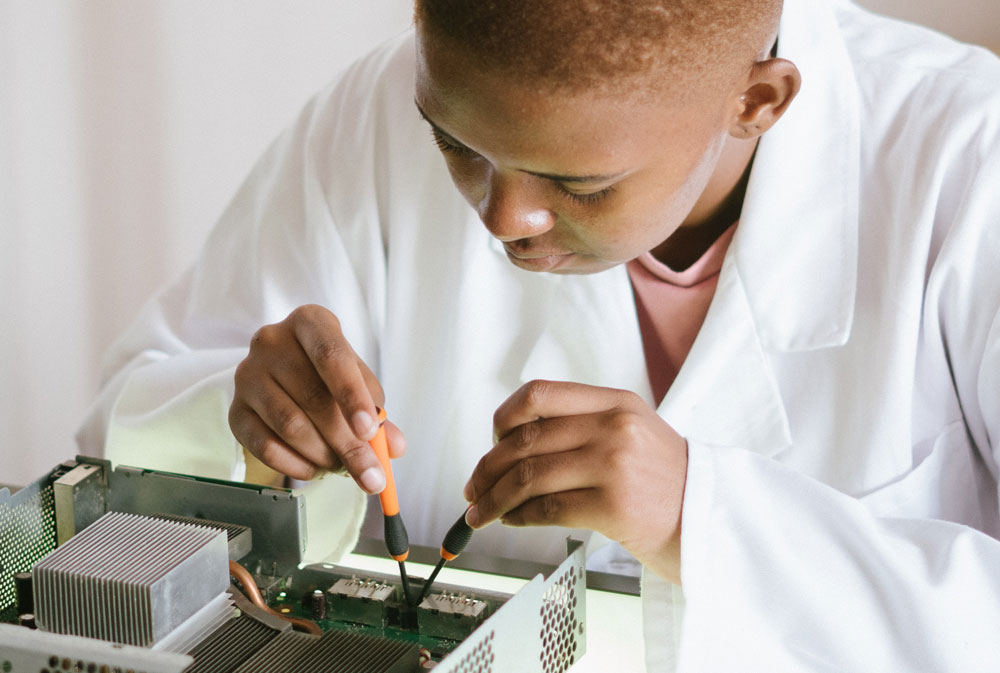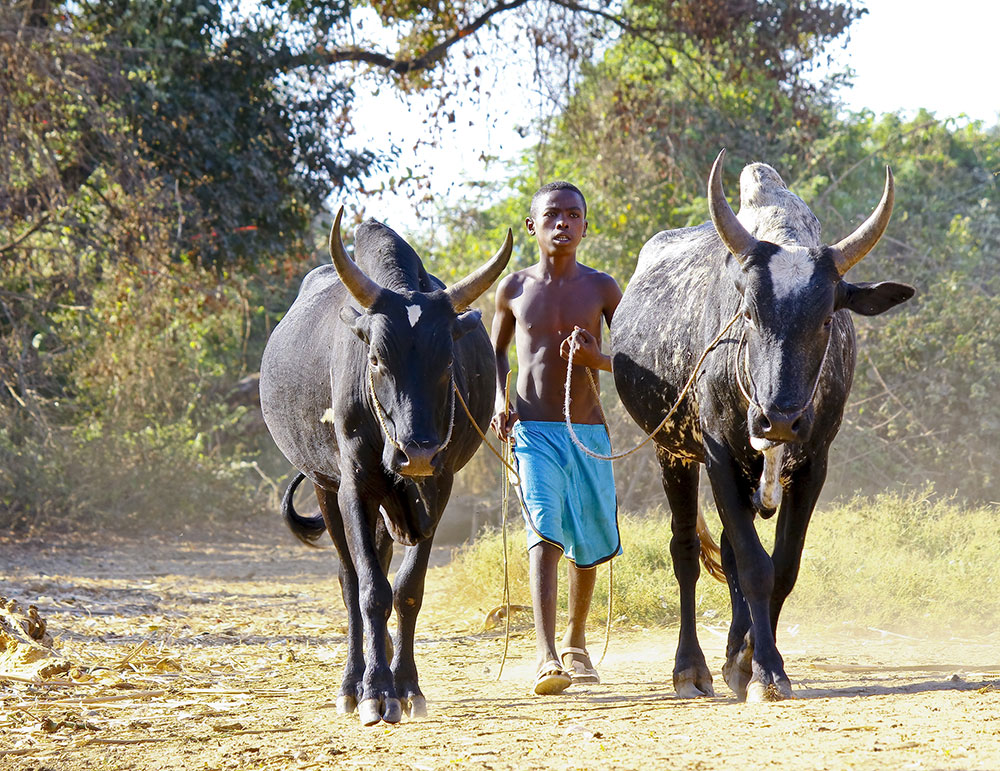DEVELOPING LOCAL SOLUTIONS
Changing outlooks


The room is buzzing as 25 eager students put their new skills to the test. At the heart of the action, a young woman carefully connects the wires on a circuit-board as her classmate checks progress against a diagram on the smartphone display. The instructor lends a hand here and there. Projected on the big screen behind him you can see a range of agricultural robots – from machines that automatically pull weeds, to drones that monitor what’s happening in the fields. It’s a new angle on farm life for the young people who have travelled from across eastern Burkina Faso to attend this workshop in Fada N’Gourma, hosted by EU-funded organisation Jeunes Ambassadeurs (JA). With as much as 80% of employment in the region concentrated in agriculture, tending livestock is part-and-parcel of their day-to-day – programming microchips, not so much. But the workshop has shown how these two worlds can come together to create new possibilities. “I didn’t know much about robots except for what I saw in sci-fi films or on TV,” reflects participant Parfait Thiombiano. “Now I’m thinking I would like to build robots for agriculture and support our farmers”.
“I didn’t know much about robots except for what I saw in sci-fi films or on TV.”
Farming is the epicentre of economic life in this part of Burkina Faso. Yet it has become increasingly difficult for local farmers to carve out a living, as tensions over limited resources are compounded by security challenges posed by extremist groups gaining ground in the north and east of the country. And research has shown that extremist recruiters can take advantage of this lack of economic opportunities, targeting unemployed young people who may be frustrated with their situation and have time on their hands. While by no means a simple matter of cause-and-effect, economic disadvantage can therefore be one factor that may push a vulnerable individual along the path of radicalisation. This is why a major aim of EU Preventing and Countering Violent Extremism (P/CVE) work is to give people the tools they need to build a better future for themselves and their communities.
The robotics workshop in Fada N’Gourma was designed to do just that. Supported by EU funding, it is one of JA’s many initiatives to strengthen social cohesion by opening new horizons for young people. A top priority is tailoring projects to the local context. And in eastern Burkina Faso, that puts agriculture centre stage. By inspiring participants to think about modernising farming techniques and providing hands-on training in basic robot assembly, the workshop showed how participants can use technology to increase yields. “It sparked enthusiasm and a desire to learn, to go further and create robots of their own,” relays JA coordinator Whali Jean Silvanu. “If young people do not have new opportunities, if they think they have nothing else to learn or that there is nothing they can do to improve their lives, they will be more vulnerable to violent extremism. We want to break that chain by showing them that it is within their own power to improve their daily lives.” Always on the lookout for a fresh opportunity, Silvanu and the JA team are now investigating a training on solar energy technology – another area with huge potential for a community where electricity outages are a common nuisance.
“If young people do not have new opportunities, they will be more vulnerable to violent extremism.”
EU-funded DJAM likewise seeks to address the economic challenges that can add fuel to societal tensions in Burkina Faso. A recent success story shifted focus from the individual to the structural level, with a drive to support local milk producers who have been facing fierce competition from imported dairy products. Facilitated by Vétérinaires Sans Frontières Belgium (VSF-B), the programme brought together representatives from across the milk production chain intending to create a strategy to promote local produce in regional and national markets. After engaging with producers to identify strengths and weaknesses of the current system, a two-day workshop in the Burkinabe capital of Ouagadougou channelled these ideas into a concrete plan of action. Collaboration was placed front and centre, recalls VSF-B’s local project manager: “The goal was for each participant to contribute actions for the strategy, as the workshop’s outcomes were to set the foundations for a new national policy to promote local milk.”
For the local producers, the programme provided a welcome space to come together and tackle a real economic challenge. And beyond this concrete short-term outcome, the experience of elaborating a business plan has given them valuable skills to advocate for their local economies in the future. For JA’s Whali Jean Silvanu, fostering this sense of purpose and direction is where the real value of the network’s activities in the region lies: “The young people we work with are the authors of their own development – we just have to give them the means to do it, so that they can be proud of what they can achieve.”
Mentorship
Mentorship schemes can be an effective way to reach vulnerable young people and guide them to make positive life choices through peer-to-peer counselling and support. Mentors trained by EU-funded initiatives such as STRIVE in Kenya go a step further by acting as a link to networks offering skills and economic opportunities – from training on financial management to entrepreneurship. Since 2016 the STRIVE mentorship programme has worked with women and men aged 17 to 30 who are at risk of radicalisation and recruitment by violent extremist organisations. Mentees are paired with a mentor close in age and from a similar background. “Mentors who have faced the same challenges as the mentees, have overcome them and chosen a positive path in life – they can relate to what the mentees are going through,” explains programme manager Hadija Suleiman Buke. Mentors are chosen based on their community work and potential to be positive role models, and receive training on the subjects they will work on with their mentees, such as life skills, VE-related issues, critical thinking and communication.
The programme combines individual and group meetings and blended psychosocial support with peer-to-peer dialogue around current issues. “In one-on-one meetings, I have the opportunity to really get to know my mentee, where they’re coming from and the issues that make them look at life a certain way,” explains mentor Zainab Mohammed. “And at bi-weekly get-togethers with all mentors and mentees, people share their experiences, which helps mentees change their perspective – they may have thought their problems were much bigger, yet they find solutions through talking with others. So they learn a lot, and we support one another.”
A central aspect of the mentorship is support in identifying training or employment opportunities. Mentors look for potential opportunities that they can share with their mentees; mentees who start businesses are given support and advice to help them grow; and those who have not yet decided what path they want to take are encouraged to reflect on their strengths and consider new options. For mentor Ms Mohammed, these efforts are closely interlinked with the work of building emotional resilience: “Both are equally important: when you give someone emotional support, they pick themselves up afterwards and will want to take action. Mentorship helps young people look at life from a different perspective – we advise them to venture into areas where they feel they have strengths, enabling their skills. When they can do that and earn a decent living, they are doing something positive to sustain themselves and to grow.”